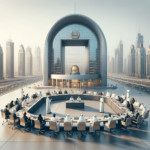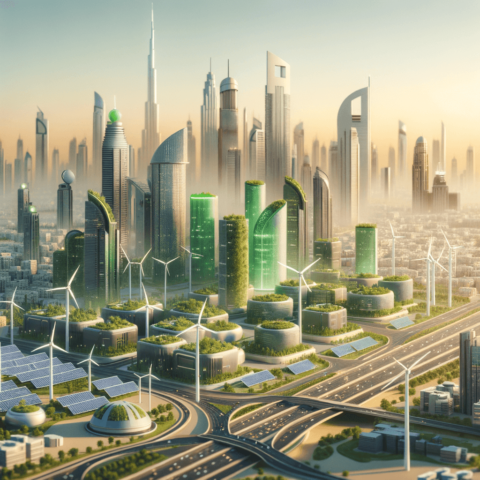
UAE AI Award Application Deadline Extended: Boost Your Innovations in Dubai
June 29, 2024
Dubai’s Ministry of Finance Aims to Eradicate Bureaucracy by 2024
July 4, 2024In a bid to align with Dubai’s vision for sustainable development, HH Sheikh Ahmed bin Saeed Al Maktoum has issued Directive No. (1) of 2024. This directive updates the Dubai Demand Side Management Strategy 2050, reflecting Dubai’s commitment to energy efficiency and clean energy.
Vision for Sustainable Development
Dubai has always been a city with a vision, aiming to lead in various fields, including sustainable development. The recently promulgated Directive No. (1) of 2024 by HH Sheikh Ahmed bin Saeed Al Maktoum is an integral part of this vision, harmonizing seamlessly with broader ambitions for the Emirate.
The goals set by HH Sheikh Mohammed bin Rashid Al Maktoum have been foundational in characterizing Dubai as a pioneering hub for sustainable development. These objectives not only aim at reducing the carbon footprint but also at enhancing the quality of life for both locals and visitors. By focusing on energy efficiency and sustainable practices, the Emirate ensures a healthier environment, economic resilience, and improved social welfare.
Directive No. (1) of 2024 is designed to catalyze innovations in energy-efficient technologies and sustainable urban planning. This directive lays the groundwork for comprehensive initiatives targeting reductions in energy consumption across residential, commercial, and industrial sectors. It emphasizes a community-centric approach that enlists the active participation of all stakeholders in realizing a greener future.
This initiative is vital for Dubai as it continues to attract international tourists and expatriates, promising a world-class standard of eco-friendly living. Sustainability isn’t just a policy directive; it’s a commitment to future generations. By embracing these initiatives, Dubai positions itself as a global leader in sustainable development, ensuring that its growth is both inclusive and forward-thinking.
Overview of the Updated DSM Strategy 2050
The updated Dubai Demand Side Management Strategy 2050 stands as a beacon of Dubai’s commitment to sustainable growth. Building upon the vision for sustainable development, this updated strategy reaffirms Dubai’s pledge to make the emirate a global leader in energy efficiency and sustainability. The DSM Strategy 2050 is intricately aligned with both national and local frameworks, including the ambitious UAE Net Zero Strategy 2050 and the Dubai Clean Energy Strategy 2050.
**Aligning with National and Local Objectives:** The synergy between the DSM Strategy 2050 and broader strategies aims to create a cohesive approach toward a sustainable future. By supporting the UAE Net Zero Strategy 2050, Dubai is committed to mitigating climate change and ensuring a carbon-neutral environment by 2050. The Dubai Clean Energy Strategy 2050 further complements this ambition by targeting 100% clean energy utilization for all power needs by mid-century. These frameworks collectively steer the emirate toward a future where renewable energy sources such as solar, wind, and waste-to-energy become integral to Dubai’s energy matrix.
**Integrated Strategic Focus:** The updated DSM Strategy 2050 highlights demand-side measures, ensuring energy efficiency and conservation remain central to Dubai’s growth paradigm. This comprehensive update focuses on enhancing the efficacy of energy use across various sectors, including residential, commercial, and industrial. The strategy sets forth rigorous targets and measurable outcomes to ensure that energy savings are realized and maintained. It underscores the importance of deploying advanced technologies, increasing public and private sector collaboration, and harnessing innovative solutions to manage energy demand effectively.
**Goals and Initiatives:** Key goals include reducing electricity and water demand, thereby decreasing reliance on non-renewable resources. The integrated approach aims to foster sustainable consumption patterns and promote the adoption of green building codes and standards. Furthermore, the strategy emphasizes the need for scaling up renewable energy projects, ensuring that new developments adhere to stringent sustainability criteria.
In essence, the updated DSM Strategy 2050 not only aims to align with national and local sustainability goals but also sets a benchmark for other cities globally. It drives the vision of a future where Dubai thrives as an eco-friendly, energy-efficient metropolis.
Implementing Mechanisms and Key Focus Areas
To drive the ambitions of the DSM Strategy 2050, seven meticulously designed implementing mechanisms will play pivotal roles. These mechanisms are the backbone for translating goals into tangible actions.
**Policies and Regulations** outline the legal framework to ensure all energy-related activities adhere to the set standards. They mandate energy performance benchmarks and incentivize compliance to inspire widespread adoption of energy-efficient practices.
**Data and M&V (Measurement and Verification)** is crucial for monitoring progress and assessing the impact of implemented measures. Rigorous data collection and analysis allow for real-time adjustments, ensuring that the strategy remains on track and objectives are fully met.
**Government Support and Leadership** is indispensable, as government agencies not only regulate but also lead by example. Their commitment and transparent practices serve as a powerful demonstration to private sectors, driving collective action towards the strategy’s objectives.
**Awareness and Recognition** programs are designed to educate stakeholders—from businesses to the general public—about the benefits and practices of energy efficiency. Public campaigns and certification programs foster a culture of sustainability and acknowledge those making significant strides.
**Financing** is another cornerstone, offering monetary resources through grants, subsidies, and incentives to support the adoption of energy-efficient technologies and practices. This mechanism alleviates the financial barriers faced by stakeholders, encouraging investment in sustainable solutions.
**R&D and Innovation** focuses on developing cutting-edge technologies and methods through dedicated research and development efforts, ensuring Dubai remains at the forefront of sustainable innovation. This includes collaborations with academic institutions and global entities to drive continuous improvement.
**Freezone Alignment and Collaboration** ensures that Dubai’s free zones are in sync with the DSM Strategy. This cooperative approach amplifies the reach and effectiveness of energy management initiatives, fostering a unified effort across all economic sectors.
By intricately weaving these mechanisms into the fabric of the DSM Strategy 2050, Dubai is laying down a robust foundation to achieve its long-term goals of sustainable development and energy efficiency.
Targeted Efficiency Programmes
Dubai’s updated Demand Side Management (DSM) Strategy 2050 underscores a commitment to energy efficiency through 12 meticulously designed programmes that span various sectors. Key among these is the **Net Zero Ready – New Buildings** initiative, which mandates that all new constructions incorporate high-efficiency designs, advanced energy management systems, and renewable energy sources to ensure they are ‘net zero ready’. This programme not only sets a standard for future residential and commercial buildings but also ensures long-term energy savings by radically reducing consumption right from the construction phase.
The **Building Retrofits** programme targets existing structures, advocating for the installation of high-efficiency lighting, HVAC systems, and improved insulation to enhance energy performance. This initiative is pivotal in transforming Dubai’s current building stock, which remains a significant energy consumer, into a model of sustainability.
**Efficient Cooling** is another cornerstone programme, essential in a city known for its extreme temperatures. By promoting the use of district cooling systems and state-of-the-art chiller technologies, this initiative aims to reduce the energy footprint of cooling by as much as 50%.
These efforts are complemented by other programmes such as **Water Reuse and Efficiency**, which focuses on reducing potable water consumption and promoting the recycling of greywater, and **Public Awareness**, which aims to educate residents and businesses about the benefits of energy-efficient practices. Together, these initiatives not only support Dubai’s ambitious energy savings goals but also create a culture of sustainability and responsibility. The integration of these targeted efficiency programmes marks a significant stride towards realizing the larger vision of the DSM Strategy 2050.
Collaborative Efforts and Stakeholder Involvement
Effective implementation of the DSM Strategy 2050 requires collaboration from multiple entities. The progress of Dubai’s vision for sustainable development and energy efficiency hinges on the synergy between government bodies and private sector entities.
Government bodies such as the Dubai Electricity and Water Authority (DEWA) and Dubai Municipality play pivotal roles in the framework of the DSM Strategy. DEWA is primarily responsible for overseeing the operational efforts related to energy and water efficiency, ensuring that the infrastructural provisions are capable of meeting the strategy’s demands. Dubai Municipality, on the other hand, contributes to setting regulatory standards and guidelines that anchor the city’s sustainable goals.
Private sector entities are equally crucial in driving this initiative. Real estate developers, energy service companies, and technology providers are actively engaged in delivering innovative solutions and practices that align with the DSM Strategy’s programmes. Their expertise in building retrofit projects, efficient cooling systems, and renewable energy integrations enhances the overall effectiveness of the strategy.
To ensure smooth implementation, stakeholder engagement platforms and forums have been established. These avenues facilitate knowledge sharing, foster partnerships, and accommodate feedback from various sectors, all of which are vital for continuous improvement and alignment with the DSM objectives.
The collaborative effort transcends mere participation; it embodies a cohesive action plan where each entity’s role is integral to achieving the desired outcomes. This comprehensive approach showcases Dubai’s commitment to achieving its sustainable energy ambitions and substantiates its position as a leading global city in energy efficiency and sustainability.
Impact on Business and Tourism
The DSM Strategy 2050’s impact on Dubai’s business and tourism sectors cannot be overstated. For businesses, enhanced energy efficiency translates to significant cost savings, allowing for more competitive operations. Lower utility bills directly contribute to a higher bottom line, and businesses can reinvest these savings into expansion, innovation, and workforce development. Furthermore, energy-efficient technologies often come with longer lifespans and reduced maintenance needs, offering additional cost benefits. These improvements not only boost individual companies but collectively elevate Dubai’s GDP.
From a tourism perspective, sustainability is an increasingly important factor for global travelers. Tourists are becoming more eco-conscious and are actively seeking destinations that prioritize environmental stewardship. By adopting advanced energy-efficiency measures, Dubai positions itself as a leader in sustainable development. Iconic landmarks, resorts, and attractions powered by renewable energy enhance the city’s allure, making it a top destination for eco-tourism. Moreover, sustainable practices contribute to a cleaner, healthier environment, ensuring that Dubai remains a vibrant and attractive city for both residents and visitors.
Aligning with the grand vision of the DSM Strategy 2050, Dubai’s reputation as a future-forward, eco-friendly metropolis will be further solidified. This positioning aids in attracting global talent and investment, fostering a robust business ecosystem. Investors are increasingly looking for sustainable ventures, and by adhering to the DSM principles, Dubai offers a compelling proposition for capital inflows. Ultimately, through sustained efforts in energy management, Dubai not only propels its economic growth but also secures its place as a premier, sustainable destination in the global arena.
Conclusions
Dubai’s updated Demand Side Management Strategy 2050 marks a significant step towards a sustainable future. By focusing on energy efficiency and clean energy, the strategy aims to create a global benchmark for energy savings, contributing to the broader vision of comprehensive sustainable development in Dubai.


